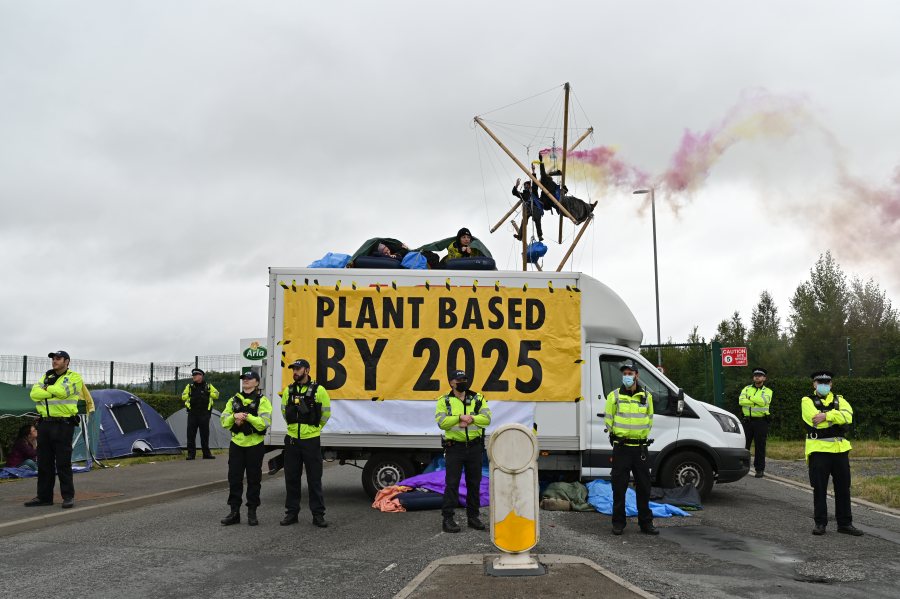
Vegan activists have blockaded a dairy distribution centre owned by Arla as part of a demand for the company to go plant-based by 2025.
Around 50 activists from Animal Rebellion, an off-shoot of Extinction Rebellion, blocked the entrance and exit to Arla’s Aston Clinton plant, in Buckinghamshire.
Protesters arrived in the early hours of Tuesday morning (31 August) and erected bamboo structures and concrete barricades at the entrance and exit of the factory.
The plant provides 10 percent of the milk supply for the UK with 150 vehicles delivering raw milk each day and 1.1 billion litres being produced every year.
The protestors demanded that Arla switches entirely to plant-based foods by 2025.
James Ozden, a spokesperson for Animal Rebellion, said: "Companies like Arla claim to be leading the way in tackling the climate crisis.
"Yet until these big multinationals start to talk seriously about the inevitable need to transition our food system to one that is plant-based, their words are empty.”
A spokesperson for Thames Valley Police said that officers were at the site of a protest outside the Arla dairy in Aylesbury.
“At 5.17am this morning reports were received that a number of protestors had gathered and blocked the entrance to the dairy. Officers attended the scene within minutes.
“A road closure has been put in place on the A41 to manage traffic and minimise disruption to the local community and businesses.
"We would advise people to avoid the area and find alternate routes. The road closure maybe in place for some time.
“Officers are on scene and are liaising with the landowner, and those who have gathered to protest, and will be working to return normality to the site as soon as possible."
The protest comes as Arla recently published a report showing the carbon footprint data from almost 2,000 dairy farms and the steps being taken to reduce farm emissions by 30% by 2030.
The report showed that farmers who supplied the co-operative were already producing milk with 1.13kg CO2e per kg of milk, around half the global average.
It also detailed the most common areas which farmers would focus on to reduce emissions further - 30% by 2030 - and the emerging technologies being trialled.
These included research to identify how to quantify and speed up carbon sequestration, which would naturally offset some emissions in the future given 79% of Arla’s farm land is used to grow grass.
Alice Swift, Arla's director of member relations UK, said: "We see this report as an opportunity to explain how we are already measuring and monitoring our progress, and provide a balanced science-based debate on the hot topics surrounding dairy.
“Arla believes that dairy can and should be part of a sustainable diet. The report is testament to the hard work Arla farmers have put in and will enable the company to advocate further on farmers’ behalf."
